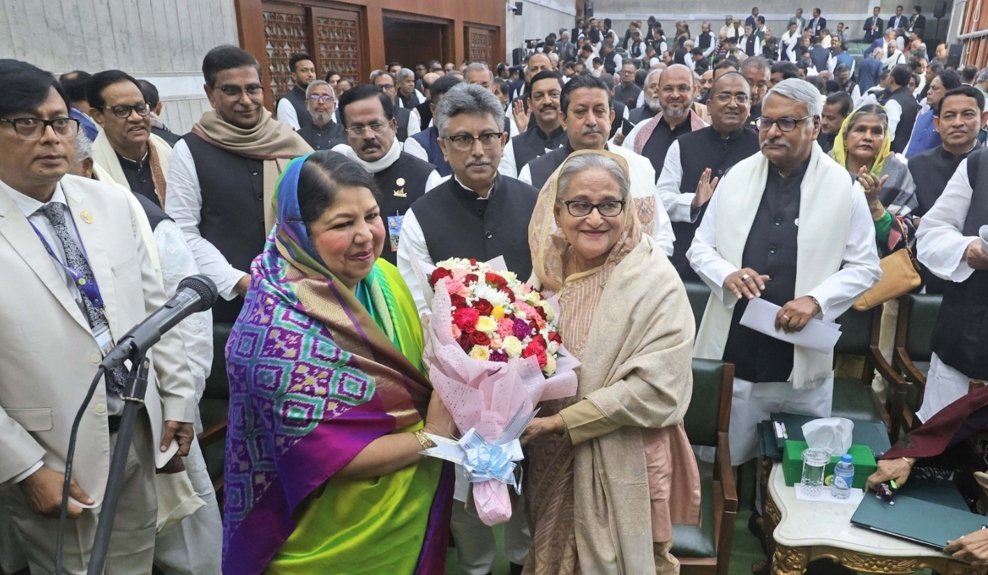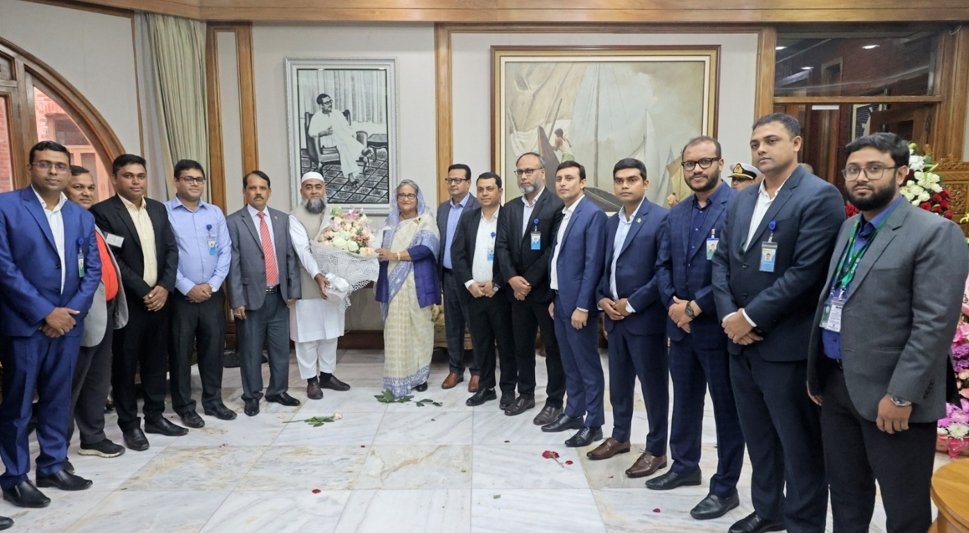In a momentous decision marking the beginning of a new parliamentary era, the newly elected members of the Awami League have once again entrusted Sheikh Hasina with the pivotal role of Leader of the House. The unanimous election during the inaugural meeting of the Awami League’s parliamentary party on Wednesday underscored the unwavering confidence in her leadership.
The proceedings of the assembly were charged with anticipation as Awami League General Secretary Obaidul Quader proposed Sheikh Hasina’s name as the Leader of the House. The proposal found immediate and unanimous support, being seconded by Chief Whip Noor-e-Alam Chowdhury Liton, solidifying Hasina’s position at the forefront of the government’s leadership.
You can also read: Sheikh Hasina Secures Historic Fifth Term Amidst Global Acclaim
Furthermore, the assembly reaffirmed its faith in experienced leadership by re-electing Matia Chowdhury as the Deputy Leader of the House. Meanwhile, Shirin Sharmin Chaudhury, adorned with a history of remarkable parliamentary stewardship, was once again chosen as the Speaker of the Parliament, reflecting the continued trust placed in her capable hands.
The meeting also resolved to nominate Shamsul Haque Tuku for the position of Deputy Speaker of the Parliament, reinforcing the importance of seasoned figures in key parliamentary roles. Additionally, the continuity of leadership was emphasized as Noor-e-Alam Chowdhury Liton is set to continue in his role as the Chief Whip of the 12th Parliament.
Unanimity and Continuity
Sheikh Hasina’s election for the fourth consecutive term as the Leader of the House attests not only to her unwavering leadership but also to the collective faith and
Sheikh Hasina’s Re-election:
- Unanimous re-election as Leader of the House.
- Reflects trust in her leadership.
Reaffirmation of Leadership:
- Matia Chowdhury re-elected as Deputy Leader of the House.
- Shirin Sharmin Chaudhury re-chosen as Speaker of the Parliament.
Nominations and Continuity:
- Nomination of Shamsul Haque Tuku for Deputy Speaker emphasizes experienced figures in crucial roles.
- Continuation of Noor-e-Alam Chowdhury Liton as Chief Whip highlights leadership continuity in the 12th Parliament.
trust of her colleagues within the Awami League. With a legacy of commitment to progress, inclusive governance, and dedication to the nation’s prosperity, her re-election sets a promising tone for the 12th Parliament’s tenure.
The nation eagerly anticipates the collective efforts and visionary leadership that Sheikh Hasina and her team will employ to address the challenges and steer the country towards a future defined by prosperity, harmony, and sustainable development.

Cabinet Formation
Following the oath-taking, the AL parliamentary party is poised to formally elect Sheikh Hasina as their leader. Subsequently, this decision will be communicated to the president for her appointment as prime minister for the fifth time, continuing her legacy since her inaugural term in 1996.
The president will administer the oath to the new prime minister, setting the stage for the appointment of ministers and state ministers selected by Sheikh Hasina to form the new cabinet.
As per Article 148 (2A) of the constitution, the newly elected MPs are bound to take the oath within three days of the election results being published in an official gazette. Failure to comply will result in the cancellation of their memberships. A gazette notification on Tuesday (January 9th) detailed the results of the 12th National Elections, revealing the composition of the newly elected 298 Members of Parliament.
The impending swearing-in of the new cabinet, scheduled at Bangabhaban at 7 pm on Thursday, comes in the wake of the AL securing 222 out of 298 seats in the national polls. Independent candidates, most aligned with AL, clinched 62 seats. Other victories include 11 seats for JaPa candidates and three single candidates each from Bangladesh Workers Party, Jatiya Samajtantrik Dal, and Bangladesh Kalyan Party, respectively.
36 Individuals Called to Take Oath as Ministers and State Ministers in New Cabinet Formation
Following the 12th parliamentary elections, the Awami League government is set to establish a new cabinet. Cabinet Secretary Md. Mahbub Hossain announced on Wednesday night that 36 individuals have been invited to take the oath as ministers, including 25 full ministers and 11 state ministers.
Full Ministers are:
Obaidul Quader (Noakhali-5), Nurul Majid Mahmud Humayun (Narsingdi-4), Md Tajul Islam (Comilla-9), Muhammad Farooq Khan (Gopalganj-1), Abul Hasan Mahmud Ali (Dinajpur-4), Anisul Haque (Bahmanbaria) -4), Mohammad Hasan Mahmud (Chittagong-7), Md. Abdus Shahid (Moulvibazar-4), Sadhan Chandra Majumdar (Naogaon-1), Rt. A. M. Ubaidul Moktadir Chowdhury (Brahmanbaria-3), Md. Abdur Rahman (Faridpur-1), Narayan Chandra Chand (Khulna-5), Abdus Salam (Mymensingh-9), Mohibul Hasan Chowdhury (Chittagong-9), Farhad Hossain Meherpur-1), Md. Faridul Haque Khan (Jamalpur-2), Md. Jillul Hakim (Rajbari-2), Saber Hossain Chowdhury (Dhaka-9), Jahangir Kabir Nanak (Dhaka-13), Nazmul Hasan Papon (Kishorganj-6), Dr. Dipu Moni (Chandpur-3) and Asaduzzaman Khan (Dhaka-12).
Besides, architects Yafes Osman and Samant Lal Sen are full ministers in the technocrat quota.
Those who are state ministers:
Begum Simin Homen Rimi (Gazipur), Nasrul Hamid (Dhaka-3), Junaid Ahmed Palak (Nator-3), Mohammad Ali Arafat (Dhaka 17), Md. Mohibbur Rahman (Patuakhali), Khalid Mahmud Chowdhury (Dinajpur-2), Zahid Farooq (Barisal-5), Kujendra Lal Tripura (Khagrachari), Begum Rumana Ali (Gazipur-3), Shafiqur Rahman Chowdhury (Sylhet-2) and Ahsanul Islam Titu (Tangail-6).
Significance of People’s Support
The scale of public support for Hasina’s leadership and vision became evident in the successful, albeit contentious, election. Hasina herself lauded the election as the most free and fair since the tumultuous events following the assassination of Bangabandhu in 1975. Her address at Ganabhaban not only celebrated the election’s integrity but also emphasized the people’s active participation as a testament to the strength of democracy.

PM Hasina’s declaration that a fair election can occur under a party government challenges prevalent perceptions. By asserting that the Awami League serves only the people of Bangladesh, she seeks to consolidate her party’s legitimacy and governance approach, aiming to quell doubts about undue influence or biases.
However, amidst the celebrations, concerns linger. The opposition’s absence from a significant portion of the electoral process raises questions about the inclusivity of representation. While the election itself avoided major irregularities, the absence of a robust opposition presence might challenge the checks and balances essential for a vibrant democracy.
Prime Minister Hasina’s triumph emerges against a backdrop of opposition boycotts and efforts to disrupt the election through violence. The resilience displayed by the people in upholding a peaceful election reflects a reaffirmation of Bangladesh’s commitment to democratic values and progress. This defiance against anticipated turmoil underscores a significant shift away from potential anarchy.


